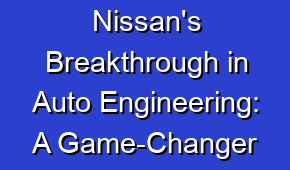Byd & Geely: The Rising Giants in the Market

Discover the remarkable market rise of emerging giants BYD and Geely. These two automotive powerhouses have been making waves in the industry, capturing attention with their innovative technologies and impressive growth. Get insights into how BYD and Geely are reshaping the market and establishing themselves as major players in the automotive world.
Emerging giants BYD and Geely have experienced a remarkable market rise in recent years. These two Chinese automotive companies have strategically positioned themselves to capitalize on the growing demand for electric vehicles (EVs) and have successfully gained significant market share. With their innovative technologies and forward-thinking strategies, BYD and Geely have become formidable players in the global automotive industry.
BYD, known for its expertise in battery technology, has emerged as a leader in the EV market. The company’s commitment to sustainable transportation solutions has resonated with consumers worldwide, driving its market rise. Geely, on the other hand, has focused on expanding its presence through strategic acquisitions and partnerships. By investing in established brands like Volvo and Lotus, Geely has gained access to advanced technologies and global distribution networks, fueling its market rise.
The success of BYD and Geely can be attributed to their ability to adapt to changing market trends and consumer preferences. As the demand for EVs continues to surge, these emerging giants are well-positioned to further accelerate their market rise. With their innovative products and strong brand reputation, BYD and Geely are poised to shape the future of the automotive industry.
| Emerging giants BYD & Geely are making significant strides in the market. |
| BYD and Geely’s market rise is challenging traditional automotive industry leaders. |
| The success of BYD and Geely is attributed to their innovative strategies. |
| BYD and Geely are expanding globally and gaining market share in various countries. |
| The competitive pricing of BYD and Geely vehicles is attracting customers worldwide. |
- BYD and Geely are investing heavily in electric vehicle technology.
- Their focus on sustainable mobility aligns with global environmental goals.
- BYD and Geely’s partnerships with tech companies are driving innovation.
- Their strong presence in the Chinese market contributes to their market rise.
- The reputation of BYD and Geely for quality and reliability is growing.
What factors contributed to BYD’s market rise?
BYD’s market rise can be attributed to several key factors. Firstly, their focus on electric vehicles (EVs) played a significant role. As the demand for environmentally-friendly transportation increased, BYD positioned itself as a leader in the EV market, offering a range of electric cars and buses.
| Innovative Electric Vehicle Technology | Government Support and Policies | Global Expansion Strategy |
| BYD’s advanced electric vehicle technology and battery production capabilities contributed to its market rise. | The Chinese government’s support and favorable policies towards electric vehicles played a significant role in BYD’s success. | BYD’s strategy of expanding its operations globally and entering new markets helped in its market rise. |
| BYD’s focus on research and development, leading to continuous improvement and innovation, gave it a competitive edge. | Government subsidies and incentives for electric vehicle adoption encouraged consumers to choose BYD’s products. | BYD’s partnerships with local companies and joint ventures in various countries helped it penetrate new markets. |
| BYD’s reputation for producing reliable and high-quality electric vehicles attracted customers and boosted its market share. | The implementation of stricter emission regulations in many countries created a growing demand for electric vehicles, benefiting BYD. | BYD’s commitment to sustainability and environmental responsibility resonated with consumers and enhanced its brand image. |
Another factor that contributed to BYD’s success was their strong technological capabilities. They invested heavily in research and development, allowing them to innovate and produce high-quality EVs with advanced features. Additionally, BYD’s partnerships with major companies, such as Daimler and Toyota, helped them expand their market reach and gain credibility in the industry.
How did Geely achieve its market rise?
Geely achieved its market rise through a combination of strategic decisions and successful acquisitions. One of the key factors was their acquisition of Volvo Cars in 2010. This move not only provided Geely with access to advanced automotive technologies but also enhanced their brand reputation and global presence.
- Geely focused on innovation and technology: One of the main reasons for Geely’s market rise was its emphasis on innovation and technology. The company invested heavily in research and development, allowing them to produce high-quality vehicles with advanced features. By constantly introducing new and improved models, Geely was able to attract customers who were looking for modern and technologically advanced cars.
- Geely expanded its product portfolio: Another factor that contributed to Geely’s market rise was its strategic expansion of its product portfolio. In addition to producing traditional gasoline-powered cars, Geely also ventured into the electric and hybrid vehicle market. This move allowed them to cater to a wider range of customers and capitalize on the growing demand for environmentally friendly vehicles.
- Geely focused on international expansion: Geely’s market rise was also driven by its focus on international expansion. The company aggressively entered new markets around the world, including Europe and North America. By establishing local production facilities and distribution networks, Geely was able to gain a foothold in these markets and compete with well-established automotive brands. This global presence not only increased Geely’s sales but also enhanced its brand reputation and credibility.
In addition to acquisitions, Geely focused on product diversification and innovation. They introduced a range of new models that appealed to different consumer segments, including electric and hybrid vehicles. Geely also prioritized design and quality, ensuring their vehicles met international standards and customer expectations.
What are the main differences between BYD and Geely?
BYD and Geely are two prominent players in the automotive industry, but they have some key differences. Firstly, their areas of specialization differ. While BYD is known for its expertise in electric vehicles, Geely has a broader product portfolio that includes both traditional combustion engine cars and electric models.
- BYD is a Chinese automobile manufacturer that specializes in electric vehicles, while Geely is a Chinese multinational automotive company that produces both traditional and electric vehicles.
- BYD was founded in 1995, while Geely was founded in 1986.
- BYD is known for its advanced battery technology, as it is one of the largest producers of rechargeable batteries in the world. Geely, on the other hand, is known for its acquisition of Volvo Cars in 2010.
- BYD has a strong presence in the Chinese market and has expanded to other countries, including the United States. Geely, on the other hand, has a global presence and has acquired other automotive brands such as Lotus and Proton.
- BYD focuses more on the production of electric vehicles and has a wide range of electric models, including sedans, SUVs, and buses. Geely, on the other hand, produces a variety of vehicles, including sedans, SUVs, and compact cars, with both traditional and electric options.
Another difference lies in their global presence. Geely has been more successful in expanding its international footprint through acquisitions and partnerships, such as its investment in Volvo Cars. On the other hand, BYD has primarily focused on the Chinese market, although it has started to make inroads into other countries.
What challenges did BYD face during its market rise?
BYD faced several challenges during its market rise. One of the main obstacles was competition from both domestic and international automakers. As the demand for electric vehicles grew, many companies entered the market, intensifying competition and putting pressure on BYD to differentiate itself.
| Competition | Quality Control | Government Regulations |
| BYD faced fierce competition from established automotive companies. | Ensuring consistent quality across its products was a challenge for BYD. | Government regulations regarding emissions and safety standards posed challenges for BYD. |
| Established companies had greater brand recognition and customer trust. | BYD had to implement stringent quality control measures to meet customer expectations. | Adhering to government regulations required significant investments and resources. |
| Competitors had well-established distribution networks and market presence. | BYD had to continuously improve its quality control processes to stay competitive. | Government regulations could vary across different regions, requiring adaptability from BYD. |
Another challenge was the need for continuous innovation and technological advancements. As EV technology evolved rapidly, BYD had to stay ahead of the curve and invest in research and development to offer cutting-edge products. Additionally, regulatory changes and government policies regarding EV incentives and subsidies also impacted BYD’s market position.
What are the key strategies Geely used to achieve its market rise?
Geely employed several key strategies to achieve its market rise. One of the main strategies was strategic acquisitions. By acquiring Volvo Cars, Geely gained access to advanced technologies and established a strong global presence. They also acquired other brands like Lotus and Proton, further expanding their product offerings.
Geely used key strategies such as strategic partnerships, innovation, strong branding, and acquisitions to achieve its market rise.
In addition to acquisitions, Geely focused on brand building and positioning. They invested in marketing campaigns to enhance brand awareness and perception. Geely also prioritized customer satisfaction by offering competitive pricing, reliable after-sales service, and comprehensive warranty packages.
What are the similarities between BYD and Geely?
BYD and Geely share some similarities in their market rise. Both companies recognized the potential of electric vehicles early on and invested in this emerging market. They also prioritized technological innovation and research and development to produce high-quality vehicles.
BYD and Geely are both Chinese automobile manufacturers known for producing electric vehicles and have a strong presence in the global market.
Furthermore, both BYD and Geely have benefited from partnerships with established automotive companies. BYD partnered with Daimler and Toyota, while Geely acquired Volvo Cars. These collaborations have provided them with access to resources, expertise, and global networks.
How did BYD and Geely impact the automotive industry?
BYD and Geely have had a significant impact on the automotive industry. Their focus on electric vehicles has contributed to the global shift towards sustainable transportation. By offering a range of electric cars and buses, they have helped reduce carbon emissions and promote clean energy solutions.
BYD’s impact on the automotive industry
BYD, a Chinese automaker, has made significant contributions to the automotive industry.
1. Electric Vehicle Leadership: BYD has emerged as a global leader in electric vehicle (EV) manufacturing. It has developed and produced a wide range of EVs, including passenger cars, buses, and trucks. BYD’s expertise in EV technology has helped drive the adoption of electric vehicles worldwide.
2. Battery Innovations: BYD is renowned for its advancements in battery technology. It has developed high-performance lithium-ion batteries that offer longer range and faster charging capabilities. These innovations have played a crucial role in overcoming the limitations of EVs and making them more viable for consumers.
3. Sustainability Focus: BYD’s commitment to sustainability has had a positive impact on the automotive industry. By promoting clean transportation solutions, such as electric vehicles and renewable energy integration, BYD has contributed to reducing carbon emissions and addressing climate change challenges.
Geely’s impact on the automotive industry
Geely, a Chinese automaker, has significantly influenced the automotive industry with its innovative approaches and strategic acquisitions.
1. Global Expansion: Geely’s acquisition of Volvo Cars in 2010 marked its entry into the global automotive market. This move allowed Geely to gain access to advanced technologies and expand its presence in international markets, contributing to its growth and influence.
2. Technological Advancements: Geely has invested heavily in research and development, focusing on emerging technologies like autonomous driving and connectivity. By incorporating these advancements into their vehicles, Geely has enhanced the driving experience and positioned itself as a tech-savvy automaker.
3. Electric Vehicle Push: Geely has been proactive in the electric vehicle space. It launched its dedicated electric vehicle brand, Geometry, and introduced various electric models. Geely’s efforts in promoting electric mobility have accelerated the transition towards sustainable transportation.
Combined Impact on the automotive industry
The impact of BYD and Geely on the automotive industry can be summarized as follows:
1. Electric Vehicle Revolution: Both BYD and Geely’s focus on electric vehicles has played a crucial role in driving the global shift towards sustainable transportation. Their advancements in EV technology and production capabilities have contributed to making electric vehicles more accessible and mainstream.
2. Chinese Automakers’ Rise: BYD and Geely’s success has showcased the potential and competitiveness of Chinese automakers on the global stage. They have challenged traditional automotive players and disrupted the market dynamics, leading to increased competition and innovation.
3. Technology and Innovation: BYD and Geely’s investments in research and development have propelled the automotive industry forward. Their technological advancements, particularly in areas like battery technology and connectivity, have influenced the overall direction of the industry and shaped consumer expectations.
Moreover, BYD and Geely’s success has inspired other automakers to invest in electric vehicle technology and innovation. Their market rise has demonstrated the potential for electric vehicles to become mainstream and has accelerated the development of EV infrastructure worldwide.





















